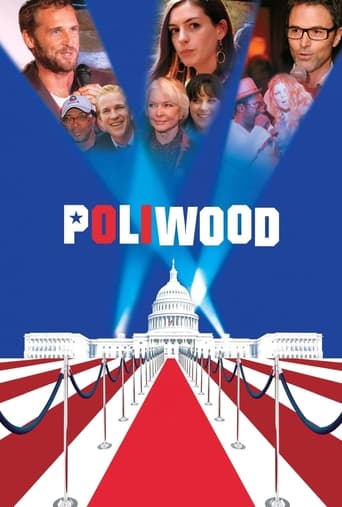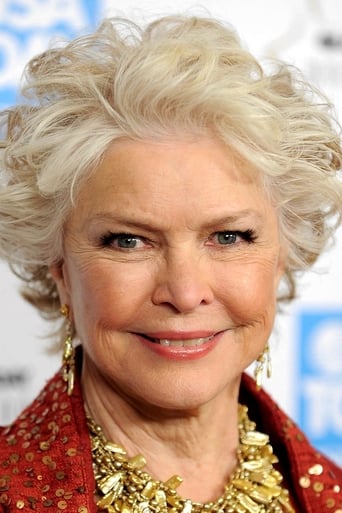PoliWood (2009)
An in-depth look at the Democratic and Republican national conventions held during the 2008 U.S. Presidential election year.
Watch Trailer
Free Trial Channels
Cast


Reviews
n my opinion it was a great movie with some interesting elements, even though having some plot holes and the ending probably was just too messy and crammed together, but still fun to watch and not your casual movie that is similar to all other ones.
Blending excellent reporting and strong storytelling, this is a disturbing film truly stranger than fiction
Amazing worth wacthing. So good. Biased but well made with many good points.
It's a movie as timely as it is provocative and amazingly, for much of its running time, it is weirdly funny.
Here's what the plot says...An in-depth look at the Democratic and Republican national conventions held during the 2008 U.S. Presidential election year.This is more of an in depth look at the Democratic celebrities who support the Obama Administration. I went into watching this documentary with an open mind without necessarily taking any specific sides but the majority of this documentary focused on the Democratic party and Obama. I was watching this film for over an hour and it was all completely focused on the liberal celebrity point of views. When it finally transitioned to the RNC it STILL focused on the democrats. This film rarely gave any opportunity for Republicans, let alone celebrity Republicans to convey their message. When the filmmakers did talk about Republicans it seemed mostly to poke fun of the party, it's members, or the Americans that supported it. I would have to say out of all the documentaries I have watched this one is not even close to being educational or living up to what the plot describes. I wish it would have just read, An in-depth look at the Democratic national convention and the celebrities that support it. That way, I could have passed over it and not wasted any of my time.
While I enjoyed Poliwood and everything it taught me about some of the actual views of celebrities, I couldn't help but feel that I was being manipulated. Everyone of the liberal celebrities is shown to be open-minded, intelligent, kind, compassionate, and empathetic. Meanwhile all of the Republicans--in one way or another--are subtly discredited. Example: The interview of Stephen Baldwin centers on religion and not politics. The entire film seemed to be about how rough the celebrities have it with their opinions not being respected. There was a clear bias in that there was rarely any mentioning of liberal media bias. The only media bias widely spoken of was, of course, Fox News. For crying out loud, Keith Olbermann, who many times out-Foxes Fox, is used to prove one of Levinson's points about conservatives. Levinson's bias is finally and ultimately revealed when he arrives at the RNC. Upon arrival, he immediately begins to crack jokes (Which might have been funny if he didn't have his sidekick ruining them). This is in stark contrast to his reverential approach to the DNC and President Obama. (Of course once the holy liberal celebrities arrive, they begin to hold meetings with conservatives about open-mindedness.)Final Verdict: 6/10 It was extremely interesting to me, however; it is a very manipulative, biased piece of film.
"A little rebellion, now and then, is a good thing, and as necessary in the political world as storms in the physical." Thomas Jefferson, letter to James Madison, January 30, 1787 One documentary film serves to highlight Tinsel town's liberal artists and celebrities as they exercise their political voice and power. Poliwood, directed by Barry Levinson and co-produced by actor Tim Daly, of the progressive Creative Coalition, criss-crosses America during the 2008 presidential campaign. Interviewing Hollywood liberals and mainstream media moguls, Daly hopes the production will underscore the main goal of the Coalition, "bringing issues to the table for national discussion".Levinson's Poliwood ambitiously interweaves several issues that that he sees as important in Hollywood: How television has changed the nature of politics, the development of politicians as "actors" in shaping public opinion, and the increasing political polarization of America.Instead, Poliwood serves to expose the hypersensitivity of today's liberal Hollywood creative community – which is understandable - given their experiences at the hands of conservative Hollywood during the Communist Inquistion of the 1950s. If the shift sometimes appears unfair, it may depend on who's looking through the lens of history.It probably comes as no shock that most artists are a pretty unconventional crew. This is due in part to their creative nature and because the very act of creating art itself needs a rather imaginative soil to grow and thrive. So, it's a safe bet that most Hollywood artists are liberal in their thinking and hence, in their politics.Levinson chose the 1959 Kennedy-Nixon presidential campaign to make his point that: "Television is a medium that lends itself to manipulation, exploitation, and gimmicks. Political campaigns can actually be taken over by the public relation experts who tell the candidate not only how to use television, but what to say, what to stand for, and what kind of person to be." The movie focuses on some of the Creative Coalition's more visible members – Tim Daly, Susan Sarandon, Anne Hathaway – as they attend both the Democratic and Republican Conventions during the summer of 2008. Levinison's camera catches their roller-coaster emotions, from breathless and teary-eyed enthusiasm during the DNC's homage to candidate Barrack Obama, to their petulant "do-we-have-to-go?" resignation at the RNC.One revealing scene occurs during an "open dialog session", facilitated by conservative pollster and communications consultant, Frank Luntz, during the Republican National Convention. He was asked (presumably by the CC) to moderate a discussion between Creative Coalition members and RNC campaigners. Levinson's camera pans the CC membership, all well-known actors, as the conservative campaigners voiced their concerns on the negative stereotyping that liberal Hollywood practices. Many in the CC entourage became visibly angry, defensive, and hostile. It was left to the more seasoned veteran liberals – Susan Sarandon, Tim Daly, and Ellyn Burstyn – to paint a pretty picture and sooth the hurt feelings all around.Even the founder of the Coalition, the late Ron Silver, laments before the camera about the current polarization of the country, which is now coming from the left-wing faction. He saw a real danger in the "intolerance on the left", because they "are unwilling to hear arguments they don't agree with." Along the way, Poliwood is successful in interweaving television's complicity as a propaganda tool with the political processes of Washington. However, the scenes of Hollywood activists displaying their different shades of bias – however humanitarian - make a stronger statement about history repeating itself.
The horrible picture quality of the footage from newscasts and movies was a big turn off. Even the clip of 'Wag the Dog' which was Levinson's own movie was presented in sub-hi-def quality image in 4:3 format. It looks like all of the other footage was highly compressed and pulled from YouTube then zoomed in to full size. The original footage of course looked fine. Not a whole lot of new or shocking themes in the movie. This would be a good primer for someone who didn't know about the Nixon/Kennedy debates or that news was driven by ratings, but not sure who that person would be. The parts of the movie that worked the best were the actors telling their personal stories.








